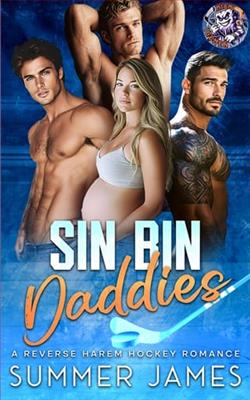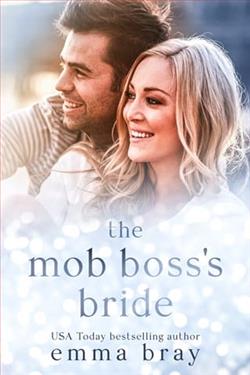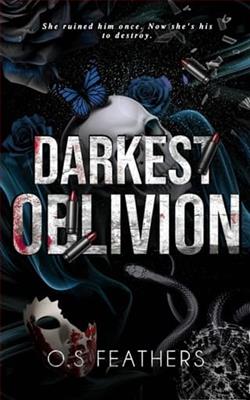Page 34 of Beloved Enemy
Reid passed his gaze over both men as they stepped forward, instantly made irritable because such feuds between the two men was becoming a regular occurrence. Tormod MacRae stepped forward boldly, pleased to be on the right side of the law, his face smug with self-righteousness while he apparently andconveniently forgot that last month 'twas he on the receiving end of Reid’s glare.
“Tormod makes a claim for—” Muirchertach continued.
“I dinna even want to hear it,” Reid interrupted, lifting his hand off the table to slice it impatiently through the air. “Nae from either one of them,” he pronounced. “Bring me Eilidh MacGregor and let me hear her claim, for damages nae doubt caused by these two ignorant fools. Fine them each six pence,” he ruled, snarling his command while glowering at the two simpletons, “and cage them in the gaol next time they so much as snarl at the other or anyone else.”
With that, he waved his hand, dismissing the two men. When they didn’t move immediately, but stared gape-jawed at their laird, several soldiers stepped forward to usher them out of the hall.
And so, the tone was set. Reid’s hand fell back to the table with a dull thud, the sound echoing in the sudden tense silence of the hall. The air seemed to crackle with the aftershock of his outburst, a clear signal that his patience was, with naught but one case heard, already precariously thin. Those waiting to have their grievances heard exchanged uneasy glances, the mood in the room darkening as swiftly as a cloud passing over the sun.
Still, they came forth as Muirchertach called them.
Domhnall Nicholson spoke on behalf of a collective group of villagers, petitioning their laird for aid in repairing the bridge that crossed one of the many rivers that carried water from the loch and into the surrounding meadows and hills. Having previously been in need of attention, the bridge had been further weakened by a strong storm several weeks ago.
Young Margery Neil’s father and uncle came forward, accusing Josias Nesbitt of breaking a marriage promise, arguing that the dowry paid had not been returned, though Josiashadn’t spoken to Margery in a fortnight and was known to keep company now with the tanner’s daughter, Grisel.
Muirchertach read the next item. “Walter Gaw is asked to respond to John Gauld concerning a plea of covenant, whereof he complains that on Thursday last in the vill of Northacre,” read the steward before pausing and lifting his gaze to watch the two men shoulder their way through the crowd, “the same Walter Gaw,” Muirchertach continued when the men stood before him, “sold to the aforesaid John one cow subject to a certain covenant, namely that the cow was with calf on the day of the aforesaid sale, when in fact this was nae the case. Whereof John complains that he has suffered damages to the value of half a mark.”
Aside from the movement of his fingers, which he regularly drummed on the table before him, for the most part Reid sat unmoving. When necessary, he conferred with Muirchertach about the word of law and pretended to consider Fiona’s input as she whispered it to him, though his sister’s views and recommendations were frequently based on her perception and opinion of the person being charged with an offense, and thus considered useless.
He ruled promptly and firmly on each matter brought before him, watching shadows lengthen in the hall as the morning progressed. When all the scheduled petitions had been heard, the floor was given to any who had a grievance to air that had not made it to Muirchertach’s agenda.
For the first time, he noticed Una among the crowd and looked immediately for Charlotte, as one was rarely seen without the other of late. His gaze swept across the hall, only to catch Charlotte standing near the hearth, her slight figure partially obscured by the broad figures of Ruairidh and Fergus. She was not looking at Reid; all of her attention was focused on the infant, Effie, securely strapped to her chest in the makeshiftsling. A few more fleeting glances at Charlotte showed that she was rocking gently, swaying back and forth, while her lips moved. He was far enough away and her voice quiet enough that he could only guess that she was singing to the babe. Aye, a tender scene that proved a wee distracting for a few minutes.
A distraction that not only Reid had fallen victim to: he noticed the eyes of the soldier closest to her, Jasper, who stood to the left of the hearth; though Jasper faced the congregating people, his gaze was cast to the side, angled directly at Charlotte.
The reason for Una’s presence at the monthly court session was made known a moment later when she came to stand before Reid at the high table. As Una wasn’t someone who regularly brought forth problems to the laird, Reid suspected her issue might have something to do with Charlotte.
“Laird,” she began after a quick bow of her head, “'tis the third week in a row now that I find my traps are disappearing. Nae all at once, mayhap one or two a week. Laid in the fen they are, for which your steward gave me permission,” she explained. “There were a dozen of them, clearly marked so nae one would be accidentally struck, but disappearing now, two each in the past two weeks and another one gone yesterday.”
Reid was well aware that upon hearing Una’s voice, Charlotte had lifted her face, pulling her attention from the bairn to listen to Una’s cause.
“If they’re nae staked to the ground,” Reid said, his tone measured, “a wounded animal can still hobble off, trap and all.”
“They were staked, laird,” Una insisted, a note of frustration in her voice. “Some were even chained to trees. I canna afford to replace them—three pence the smithy wants for a new trap, and I’ve nothing to trade.”
“'Tis a fair price for my labor,” the smith, Finlay, interjected with a hint of defensiveness. “Cost me plenty—time and coin—to maintain my forge. I canna give them away for naught.”
Reid raised a hand, silencing Finlay with a firm gesture. “We’ll see to it that ye have new traps, Una,” he assured her, his voice carrying the authority of his position. “And we’ll look into what’s become of the missing ones.”
Though it had been years since the last incident, this wasn’t the first time traps had gone missing around Kingswood. Reid made a mental note to instruct Finlay, as he had before, to mark the new traps with distinctive, hidden engravings. If they were stolen, the thief would find it difficult to deny the crime when confronted with the unmistakable markings.
Finlay, however, wasn’t ready to let the matter drop. He glanced from Una to Charlotte, a sneer curling on his lips as his gaze settled on the latter. “Mayhap yer housemate has something worth trading. I accept services as well as coin and goods, ye ken.”
Reid’s eyes darkened at the innuendo, his patience wearing thin. He leaned forward slightly, the weight of his authority palpable. “Mind yer tongue, Finlay, lest ye find yerself in need of more than a forge to fix what’s broken.”
A few snickers were heard in response to Reid’s threat, and Finlay’s lips thinned as he glared at his laird.
“Next,” Reid called, dismissing Finlay with practiced ease. The man was often found at the center of any unrest or rabble-rousing.
“Aye, laird,” called out a craggy voice.
The crowd parted slowly, a murmur passing through them as old Angus Arrot hobbled forward. By many years, he was the eldest at Kingswood, his body bearing the unmistakable marks of time—knobby knees that creaked with each step and flesh weathered into deep lines. Yet despite his age, there was a vitality in him that defied his appearance. Though his frame was frail, Angus was known to outwork men half his age, his hands still steady and strong in their labor.
“What have ye, Angus?” Reid asked, inviting the old man to air his complaint.
“The woodland near the edge of the fields, Laird,” Angus began, his voice stronger than one might expect from a man of his years. “Just beyond me croft—I kent strange folk there last night, creeping about where they ought nae to be. Kent they were thieves, I did, but nae, they were only huddled and meeting.”
Reid leaned forward slightly, resting his elbows on the table, and gestured with open hands, silently urging the man to continue.















